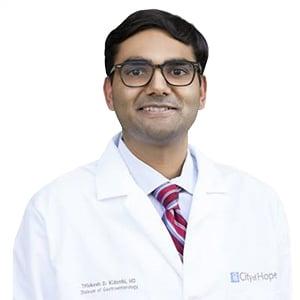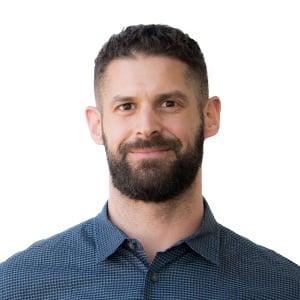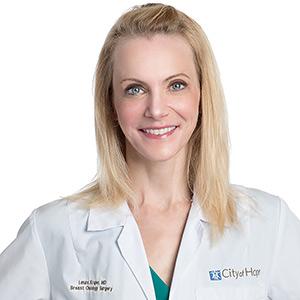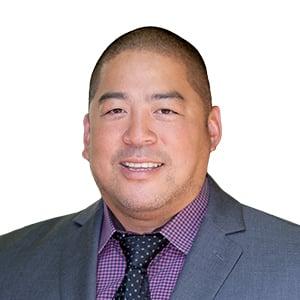Emile Auguste Jr., a 64-year-old mortgage banker from Monrovia, California, has no qualms about maintaining his regular colorectal cancer screenings in the current COVID-19-altered environment.
“Concerns? Not for me!” he said.
Despite having many relatives with cancer, Auguste had never gone in for a colonoscopy until early 2020, when he began experiencing abdominal pain. Diagnosed with colon cancer, he needed surgery to remove 9 inches of his large intestine where the cancer had created a blockage.
Now he heads to City of Hope — by himself because no visitors are allowed — every 90 days for a follow-up visit, and he’ll need annual colonoscopies for the foreseeable future. He doesn’t worry about exposure to the coronavirus. Keeping tabs on his medical condition is too important.
“I can understand some people’s fears,” he said. “But I think you’re more at risk not knowing. And City of Hope does a great job keeping you safe.”
People’s fears, however, do persist.
Studies have shown that cancer screenings pretty much fell off a cliff early in the pandemic. Many hospitals, overwhelmed with COVID-19 patients, were forced to shut down screenings and other “elective” procedures. Where such tests remained available, many patients felt afraid to visit medical facilities. At its worst point, one study says the pandemic led to an 86% drop in colon cancer screenings and a 94% decrease in breast cancer and cervical cancer tests.
City of Hope physicians saw those declines and scrambled to address them.
“There was a six-to-eight-week period where my outpatient clinical practice shifted to almost exclusively telehealth visits, and we performed only urgent and emergent endoscopic procedures,” said Trilokesh Kidambi, M.D., director of the colon cancer screening program at City of Hope. “Screening exams were all rescheduled to a later time as we sought to understand the risk to patients and providers while considering scarce resource utilization.”
“My practice changed during the pandemic,” added lung cancer surgeon Dan J. Raz, M.D., M.A.S. “Initially we saw a decline in screenings during the first six months, not just here but nationally.”
Because preventive screenings — mammograms, colonoscopies, Pap smears, PSA checks and others — are so critical in detecting cancer at its earliest and most treatable stages, doctors get alarmed when their patients stop coming in. And while we may not know for years how many tumors grew or spread undetected because of the pandemic, logic suggests many of those patients may be in for some difficult news down the road. Indeed, it may already be happening.
“We are seeing more patients presenting with larger breast cancers or involving nodes,” said breast cancer surgeon Laura Kruper, M.D., M.S., “probably due to lack of screening.”
“I have found colon cancers in patients with symptoms that began early in the pandemic who waited to get their procedures,” added Kidambi.
The good news is that as the pandemic progressed and medical facilities adapted with strict safety procedures and educational outreach (and especially once vaccines were rolled out), screening levels began to climb again. But they still have not approached prepandemic levels. A follow-up study indicated that breast cancer screenings remain 13% below historical averages, colon cancer screenings 25% below and cervical cancer screenings 21% below.
Now the fear is that the Omicron variant will scare people all over again and keep them away even longer.
“I saw things turning around before the Delta variant,” said prostate cancer specialist Clayton S. Lau, M.D., the Pauline & Martin Collins Family Chair in Urology. “People were coming back.” Now the highly contagious Omicron variant has complicated things even further.
Human nature may have the last word. “People will avoid elective procedures whenever they see a surge [in the virus],” Raz said.
Screening Guidelines
If you’re generally healthy and have no symptoms, screenings help you stay that way. Accordingly, the Centers for Disease Control and Prevention strongly supports regular screenings — virus or no virus — for colon, breast and cervical cancer. (Ages and frequency guidelines vary.) The CDC adds lung cancer screening to that list (generally an annual computed tomography scan of the chest) if you’re a heavy smoker or smoked in the past and quit. The agency is less adamant about other screenings for asymptomatic people. Nevertheless, Lau and others point out that a significant number of prostate cancers (which normally grow slowly) can be aggressive and dangerous. He recommends annual blood tests to stay current with your PSA (prostate specific antigen) score and taking note of any abrupt changes.
The day may yet come when patients will be able to do their own screenings at home. Already some possibilities — like stool-based kits for colorectal cancer — exist to a limited degree. Raz points to other options on the horizon, like a so-called “liquid biopsy” involving a blood test given by a technician who comes to your home. Telehealth, which has dramatically grown in use and acceptance during the pandemic, also promises to play a greater role going forward.
For now, though, the surest way to overcome fear of COVID-19 exposure is to understand how well your medical facility guards against the coronavirus. From the start, City of Hope instituted strict protocols that minimized COVID-19 transmission and kept everyone safe. “I feel confident,” stressed Raz, “that you face less risk at City of Hope than you do going to the supermarket.”
As a cancer survivor, Auguste feels all of this more acutely than most. And he has an additional reason to urge everyone to continue their screenings. In one of his follow-up visits, doctors detected a previously unknown case of high blood pressure — serious, but treatable. “That visit saved me!” he said.
“By getting screened,” he added, “you help maintain your health, for your sake and the sake of your family, your kids who look up to you. You can set an example.
“Why wouldn’t you want to do that?”




